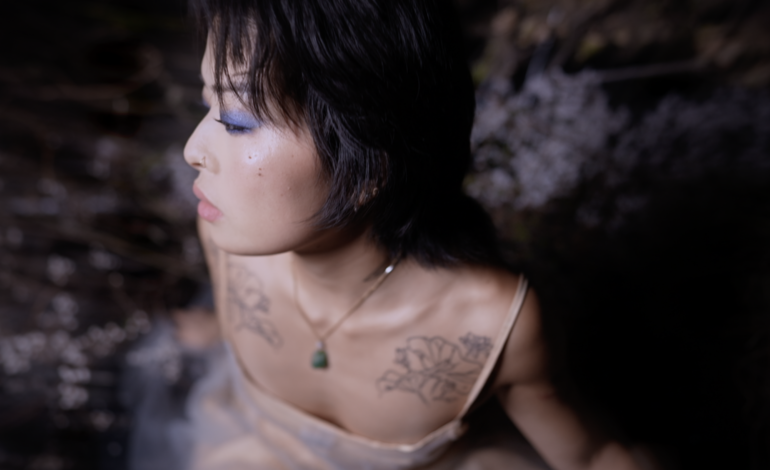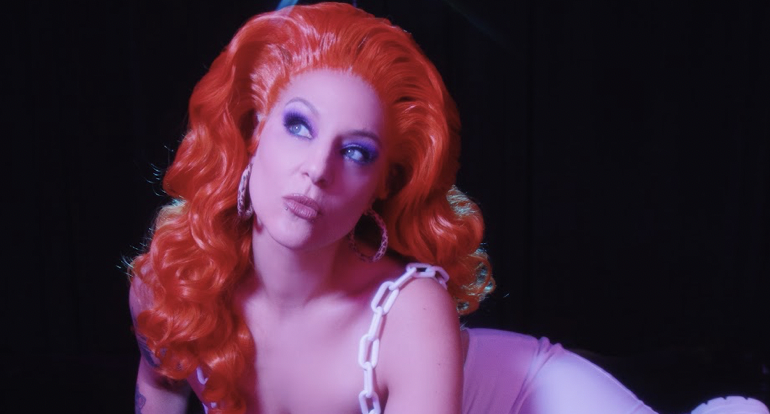Rising experimental pop star, Rebekka Louise, has released her debut album ‘Shame Is An Old Friend’. What began as a Master’s thesis project, has since evolved into Rebekka’s deeply personal and experimental debut album. As a profound exploration of mental health and its impact on both internal and external realities, ‘Shame Is An Old Friend’ is set to captivate listeners now it’s released to the world. We talk to Rebekka about the album!
“Shame Is An Old Friend” started as a Master’s thesis project. Can you tell us more about how it evolved into your debut album and the journey that led you to this point?
I probably realised about halfway into making the album that this was going to be my debut album. I just really loved the songs and wanted to share them with the world. I also think they touch upon such an important subject that I feel is not really discussed that much, and I wanted to share those perspectives and maybe offer a new way to approach mental struggles. But it is also a project that I am extremely proud of and felt really represented me as both an artist and as a producer.
Mental health is a central theme in “Shame Is An Old Friend”. What inspired you to delve into such a personal and complex subject in your music?
It started from a point of me knowing very little about the topic. As I moved to another country and was exposed to people with very different backgrounds to me I started to realise how little we talk about mental health in Norway. It was something I knew almost nothing about, and I desperately wanted to learn, and maybe (hopefully) try to understand all the different perspectives and feelings involving mental health. So the album was very much an exploration of situations I knew very little about, and then slowly being able to also apply those feelings to my own life while learning about an extremely complex and difficult theme.
You mentioned that creating this album was a cathartic experience. Can you share any specific moments during the creation process that were particularly healing or transformative for you?
It was really the first time music production kinda clicked. Producing this album felt right, if that makes sense? The melodies kept on coming and everything very smoothly merged together into a concept and album I absolutely love. In a way it felt like this album was me releasing feelings and answering questions I didn’t really realise I had – and then suddenly it all made sense. I did a lot of growing up while creating this album and definitively got a much better understanding of mental struggles.
Your album features a blend of electronica and live string sections. How did you approach the sound design for this project, and what was it like experimenting with digital instruments?
I love love love digital instruments, I find it so much fun to sit around and find new and interesting sounds. Actually, the whole album is created using only Logic stock instruments – except for the string sections which are a blend of me playing live cello and digital strings. So there’s not really any fancy synthesisers or anything on this album, just me finding an interesting sound and manipulating it until it sounds how I like. But I love that although there’s no fancy, expensive or very exclusive synths used to create this album it still sounds good. There’s also so much potential when using digital instruments, your imagination is really the only thing stopping you.
The recording process took place primarily in your living room, with some tracks recorded at Tileyard Studios. How did these different environments influence the sound and feel of the album?
So I produced all of the songs at home which I think helped give them that personal and really intimate feeling. And I would say that goes for the vocals I also recorded in my living room, they sound more upfront and personal – maybe a bit imperfect? Which worked perfectly for songs such as ‘the mess that wanted love’ and ‘i wonder why’, where the vocal delivery is more raw. But for songs such as ‘Twisted Affection’ I wanted the recorded vocal to be more ‘processed’ and ‘perfect’ so recording them in a professional studio definitely helped to deliver that more polished sound.
You’ve drawn inspiration from artists like Aurora, Maria Mena, and Billie Eilish. How have these influences shaped your musical style and the direction of this album?
They definitely helped me to be a bit bold and explore with different sounds. A lot of AURORA’S work inspired the more percussive elements of the album, especially with ‘the mess that wanted love’ which has this very hard hitting, metal like percussive element that borders on sounding ugly. In contrast, I love how stunning Maria Mena’s productions are and I loved playing with the contrast of creating beautiful sonic pictures followed by more distorted and unnerving productions. It was also really important for me to create an album that wasn’t just a compilation of sad songs and ballads, as the theme is so heavy, I wanted to include more interesting rhythmic elements as well. I think Billie Eilish and Phinneas does such a great job of creating upbeat, rhythmically interesting songs while also having very depressing and hard hitting lyrics – and I loved playing with different rhythms and syncopated bass lines to create this sense of urgency and movement within the songs.
Your lyrics are described as raw and unfiltered. What is your songwriting process like, and how do you manage to maintain such a high level of honesty and vulnerability in your work?
Honestly, it’s because most of the time they are literally the first thing that comes to mind. I very rarely go back and change lyrics, for some reason I get very attached to the first things I write down and I never want to change them. Not to say everything I come up with is great and works, cause it absolutely does not haha but more often than not I get this lyrical idea in my head and I stick with it. I’m not always the best at expressing my feelings, but when it comes to songwriting I allow myself to really express all those things I never would have dared say out loud – so I really respect that part of myself and want to stay as true to that as possible. So if I write some really hard hitting and vulnerable lyrics I like to leave them be as that was what I needed to write at that moment and that is what that song then needs to say. I also think it can be very beautiful to have lyrics that aren’t perfectly constructed, but more of a broken stream of consciousness.
“There’s Something In The Shadows” was a prelude to this album. How does that single set the stage for the themes and sounds explored in “Shame Is An Old Friend”?
I think this song really introduced how dark this album really is. It quite literally gives shape to our own anxieties and how it feels as if they’re slowly taking over your life. The lyrics express giving into the madness going around in your head and kind of thriving in that madness. The production is a great example of the very heavy use of synthesis used throughout the album, but I think it just adds such a dark and mysterious vibe to the song that I love.
Listen To Rebekka Louise on Spotify | Apple Music
Find Rebekka Louise on Instagram | Facebook | TikTok


